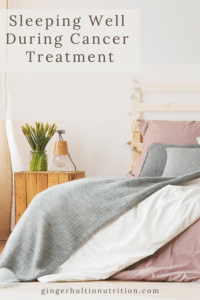Sleeping Well During Treatment for Chronic Diseases
April 24, 2023 by Ginger Hultin MS RDN
Many people are curious about integrative care plans when they are going through cancer and other chronic disease treatments. They want complementary treatments to reduce side effects and make the treatments a little more manageable. This blog focuses on lifestyle changes like proper nutrition, incorporating exercise into your everyday life, and different types of supplements to help reduce side effects. I want to discuss another huge factor: the importance of sleep. Getting a full night’s rest and giving your body the time to properly recover and prepare for the next day ahead is so important for health and for helping your body during times of stress.
I work with many clients who are receiving cancer treatment and I’ve found most of them have trouble sleeping. Research suggests that people who are currently undergoing cancer treatment or are in their survivorship phase are 33% more likely to have difficulty sleeping. This can be due to a few factors: mental and physical exhaustion, stress, pain, and side-effects of cancer treatment may be disrupting a healthy sleeping pattern. Not getting enough sleep can take a negative toll on your overall health and can make everyday life a little bit more difficult, whether or not you have cancer. If you are struggling with a regular sleeping schedule, I am here to help. We are going to dive deep into the benefits of proper sleep, why you should emphasize a healthy sleeping schedule, and some tips on how to fall asleep and stay asleep.

Why sleep is beneficial
Immune support
Sleep has been proven in studies to improve the immune system and you want your immune system fighting for you during treatment. The medications and treatments that people going through cancer treatment usually receive have a side-effect of weakening the immune system. People who are going through cancer treatments are often at a higher risk of getting sick, which can be dangerous if you’ve got a weakened immune system and could stop you from getting treatments you need. Getting a recommended 8 hours of sleep daily has been associated with increased immune cell activity, which can decrease the risk of illness or infection. For people already at a higher risk of illness, this little boost can be so beneficial.
Inflammation
Getting a proper amount of sleep also has a positive effect on inflammation. Poor sleep has been shown to increase the amount of inflammation in the body. While inflammation is a natural biological response from the immune system to fight infections, chronic inflammatory responses can do more harm than good. Getting enough sleep can reduce the amount of unhealthy inflammation inside of the body. If you would like to learn more about inflammation and how nutrition can help prevent it, check out my Anti-inflammatory Diet Meal Prep book.
Mental health
Finally, sleep is so important for maintaining positive mental health, reducing stress, and improving mood. Being well rested can help keep you energized to continue to live your daily life, which can be difficult at times due to treatments. Treatment for chronic disease can have major side effects of fatigue, and being able to get sleep and rest can help your fight a little bit easier.
Your holistic insomnia care plan
There are quite a few ways to improve your sleep. It may seem difficult when you are lying in bed wide awake, frustrated (and tired), but I am here to share some of my favorite and evidence-based tips. To start off, you must go to bed when you feel tired. This may seem obvious, but really tune into the way your body feels and as soon as you feel a little tired, get into bed right away. You may feel sleepy at any time during the evening, but try listening to your body’s natural cues. Falling asleep when your body tells you to may be the signal you need to a good night’s rest.
Another important step for improving sleep is to stop using electronics for 30 minutes to one hour before bed. Many screens release blue light, which has been associated with impairing our body’s synthesis of melatonin and can increase our stress hormone levels, which keep us awake. Melatonin is a hormone in our body that makes us sleepy and helps us fall asleep. Instead of watching TV or using your phone at night, try reading a book, listening to music, drawing, writing, stretching, yoga, or anything you enjoy to eliminate blue light exposure and get melatonin flowing through your brain.
Not only is exercise beneficial for your health and wellness, but it also can help to improve our sleep. Exercising for 30 minutes a day can reduce our stress levels by increasing endorphins and physically tiring our body, which can actually improve sleep. Try not to do any high intensity activity three hours before bed, as this can make getting to sleep more difficult. Light activity, like stretching or yoga, can be beneficial as a before-bed activity to help our body to relax.
Sleep hygiene
Focus on relaxation. Getting into a bedtime-pamper routine to help you mentally prepare for the night ahead. Take a shower or bath, consume some caffeine-free tea, stretch, whatever helps you to clear your mind. Falling asleep and staying asleep can become easier with a meditation app. Some meditations are just relaxing sounds and others have guided meditations to help promote sleep. I’m a huge fan of these and have been using both “Calm”, “Headspace” and even some options available on YouTube.
Another thing you can do is make your room sleep-friendly. Get some light blocking curtains, make sure your room is at a comfortable temperature, and wear comfortable clothing. Preparing yourself mentally and preparing your sleeping space can make bedtime hassle free.
Sleeping well during treatment
If you continue to have difficulties sleeping soundly after trying some of these ideas, reach out for more help. Do not hesitate to get into contact with your doctor to discuss your side effects. There are some medical interventions to try if you are experiencing a lot of restlessness or insomnia during the night like medications or herbs. Your doctor is here to help in any way possible. There are some supplements that may be appropriate for you, such as melatonin, but I want you to work with your doctor and dietitian on that specifically.
Sleep is extremely important for individuals with chronic diseases. It can help improve the immune system, help decrease inflammation, and can support mental health. Always remember and value the importance of resting your body to maintain the best health possible when you’re trying to heal.
What have I missed? Do you have any sleep tips that you’ve found helpful? Drop a comment below!
1 Comments
Leave a Comment

Ginger Hultin,MS, RD, CSO
Thanks for visiting! If you're struggling with a cancer diagnosis, autoimmune condition, gut health problems, or even a medical mystery, nutrition can make a HUGE difference in your day-to-day life. I run a virtual, concierge private practice where I partner with my clients over time to help them improve their health through nutrition. Be sure to visit the blog for easy, plant-based, anti-inflammatory recipes and our "Resources" page for a variety of self-paced programs, books, e-books, and nutrition podcast episodes.




Nice post